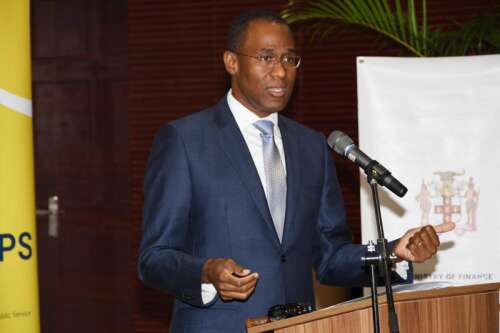FINANCE and Public Service Minister Dr Nigel Clarke is defending the Administration’s handling of wage negotiations with public sector bodies after the Opposition again raised concerns about the process, which has left some workers disgruntled.
Opposition spokesperson on finance Julian Robinson, during the debate on the fourth supplementary estimates which were tabled in Parliament by Clarke on Tuesday and later approved by the House, chastised the finance ministry for how poorly it has been communicating with some of the public groups.
Robinson highlighted, in particular, the Registrar General’s Department RGD], which staged a sick out this week, “occasioned by dissatisfaction with the process”.
“They were communicated to [and advised] that they would be placed at a particular level. [But] there seems to have been a unilateral decision to move them to a level below. They sought clarification, they didn’t get that clarification and as such they resorted to industrial action. There are two issues; there is the substantive issue of where they are placed, but there is also the issue of how they are dealt with,” he said.
Robinson said he has been getting “too many complaints” that correspondence to the finance ministry was not being answered, or dealt with in a timely fashion which he said has led to a significant degree of restiveness on the part of a number of groups, not just the RGD.
“So timely communication with the various groupings raise are responded to in a [satisfactory] manner. We are not going to have everybody satisfied but if they feel that their concerns are not being addressed, it is going to lead to restiveness which is what exists with a number of the groups now,” he said.
Clarke countered that the exercise “is not simply a salary increase”, pointing out that the Government has completed two rounds of negotiations with all unions and bargaining groups in Jamaica and done so successfully without an incident.
“The four-year deal between 2017 and 2021, completed in 2018/2019, and the one year negotiation in 2021… differ from what we are doing here in this exercise in that this is a restructuring of compensation where an old compensation system of 325 grades is being moved into new a compensation system of 16 grades. So there is a mapping exercise that is central to the process,” he explained.
He noted that the public service is fragmented in its organisation, with the number of public bodies standing at 140. In addition, he said there are 40 bargaining units and unions which amount to 180 entities with which the ministry has to engage for this exercise.
“Engaging with 140 public bodies is not about a single percentage for everybody in the public bodies. It’s a mapping exercise from an existing structure into a new structure. By definition, persons will have different opinions as to where within a structure one ought to be placed,” he said.
Clarke said that another issue that has not been properly expressed in the public domain is that there are pre-existing relationships with the central civil service and there are various views within the public service as to how those relationships should evolve.
“There are many in the central civil service who believe that the premium that those in executive agencies have enjoyed over the central civil service for similar jobs, that that premium was intended to be temporary,” he said
“That’s the view for some people — that executive agencies were singled out and treated separately years ago and the compensation restructuring provides an opportunity for harmonisation. There are others within executive agencies who have a different view who believe that that premium was not intended to be temporary and it should be extended through this exercise,” he added, noting that the Ministry of Finance and the Public Service sits in the middle of those contending views within the public service.
Dr Clarke further argued that the process of resolving these bands across 140 public bodies to be done in a single financial year — between November and March, given that the agreement with the Central Confederation was agreed at in March — ” is going to lead to what we are experiencing”.
The finance minister further intimated that doing this kind of reorganisation of moving from 325 grades to 16 is a testimony to the robustness of the process with only a few groups outstanding out of 140.
“This Government is doing something that should’ve been done decades ago. We are displaying the courage to not walk by a structural problem which has existed for far too long and gloss over it with a single increase which applies to all groups. Instead, we are doing the hard work which is painstaking, which requires a lot of engagement across a number of entities…[and is]…an arduous undertaking that we are committed to,” he said.
Now you can read the Jamaica Observer ePaper anytime, anywhere. The Jamaica Observer ePaper is available to you at home or at work, and is the same edition as the printed copy available at https://bit.ly/epaper-login
HOUSE RULES

